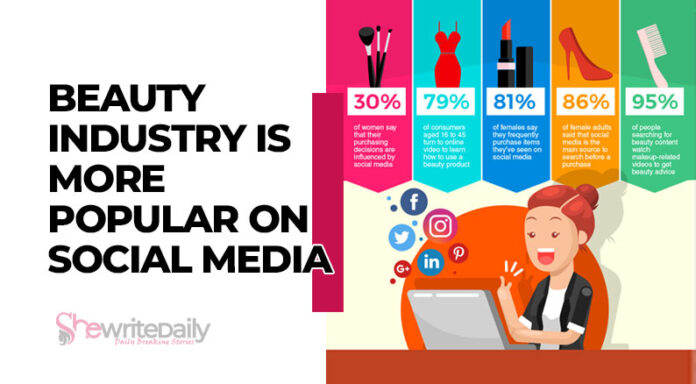The beauty industry wasn’t just the first to hold social media marketing and influencers. Cosmetic brands were among the first companies to be convinced of the potential power of social media influence. They made it a key aspect of their marketing strategy, and we’ll explore why influencer marketing is so effective for this specific product.
Consumer Perspective
Social media is a popular way for consumers to look for inspiration, whether from their consumers or influencers or the brand names they like. According to the latest research (download required), 42% of 18- to 24-year-olds get their inspiration from social media for inspiration when it comes to makeup. Indeed, lots of beauty-related content can be found on every major social platform.
For better or worse social media has heightened the importance of how you look, particularly with selfies taking control of Instagram in the past decade. Millions of users display their latest haircuts, beard styles, and beauty routines. The #beauty hashtag is the top trend on Instagram, with over 490 million photos. In addition, 86% of the top 200 beauty-related content on YouTube was made by users, not companies.
Reviews and Recommendations
Reviews and recommendations from our fellow consumers or circle of friends usually affect those around us the most. According to MSLK, User-generated images are viewed seven times more trust than traditional ads. Seeing real people like us sharing advice and “beauty secrets” gives the brand credibility and creates a sense of FOMO and peer pressure. Apart from being one of the most compelling content users create, it costs no money and is accessible in large quantities across multiple channels.
Of course, they are also following beauty influencers. A recent study conducted by Harvard Business School found that 62% of women follow celebrities on the web as beauty experts. Content creators also rank the highest for influence on the purchase of beauty products, closely followed by third-party product reviews and professionals in the beauty field.
Influencer Perspective
Certain social influencers have built extremely strong communities over time, allowing them to impact their industry significantly. For instance, consider Bianca Classen of BibisBeautyPalace. Bianca is among the most popular German influencers, with 7.8 million fans on Instagram, and can make waves across the country with her tips for beauty and tutorials.
The most influential influencers have evolved from supporting beauty brands to developing exclusive cosmetics lines or becoming entrepreneurs. For example, Emily Weiss launched her beauty blog “Into The Gloss” as an off-the-wall project in 2010 before becoming a full-time professional influencer by 2013. Her blog surpassed one million readers per month. She eventually created her direct-to-consumer beauty website Glossier.com in October 2014.
Kylie Jenner was a well-known model and social media celebrity with millions of fans before launching Kylie Cosmetics’ famous matte liquid lipsticks. They ultimately turned into a major beauty industry. The sale of 51% of Kylie Cosmetics to Coty in 2019 made Kylie one of the most self-made billionaires.
Platform Perspective
Instagram is still the most effective social platform for beauty brands, with 90% of all posts about beauty in 2020 being published on Instagram. With the ability to incorporate links to the websites of brands or e-commerce stores, It is an excellent platform to show off products for younger customers. Instagram also is the most popular platform for influencers to showcase their content and interact with their followers via makeup tutorials, video tutorials, giveaways, and giveaways.
YouTube
With over 2 billion monthly users, YouTube is a top platform for beauty and beauty brands, particularly because of its popularity for instructional videos and product tutorials. However, the pandemic has accelerated the trend toward short-form videos, as evidenced by the rapid growth of TikTok.
With over 100 million daily users, mostly from Gen Z — and a unique algorithm encouraging popularity, TikTok has emerged as an important platform for brands in the beauty industry. It was evident in the year 2020 when e.l.f. Cosmetics”#eyeslipsface” established record. TikTok is a record of the largest popular challenge across the United States, with more than 1 billion views.
Even though they’re not the main selling channel for cosmetic brands, social platforms increasingly allow consumers to purchase directly from their sites through online catalogs for social media, shoppable Pinterest, or the integrated calls to take, a growing number of beauty brands are also offering social shopping functions or trials.
The top 20 international cosmetics manufacturers only account for 14% of their sales through the e-commerce market, but that’s beginning to change. In the meantime, influencer marketing will only increase as brands that sell on social platforms typically depend on influencers to drive sales or hold online shopping parties.
Brand Perspective
According to a GWI study (download required), For the first time in history, younger users have come across more brands through ads on social media than any other medium. Unsurprisingly, brands in the beauty industry are increasingly shifting their ads to social media, which is now one of the most popular categories of products.
A study from Launch Metrics (download required) found that 83% of marketing experts rated Instagram among their top-performing channels. With more people spending time on social networks with their favorite content creators, beauty brands increasingly partner with beauty influencers to connect with their intended viewers. For instance, the big beauty brand Estee Lauder already spends 75% of its marketing dollars collaborating with social media influencers.
Conclusion
Unsurprisingly, the influencer approach to marketing is now an important factor that has led to the success of cosmetic and beauty brands throughout all their marketing channels. From increasing awareness and forming loyal customers to driving traffic to their websites and increasing sales at traditional retailers, there are no limits to the possibilities.


